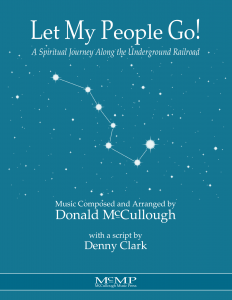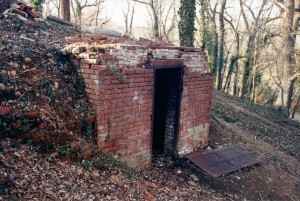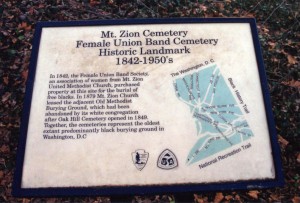LMPG! is a 75-minute work in 22 movements that interweaves spirituals and an historically-based script. Celebrating two of America’s most venerable cultural treasures–the African-American spiritual and the Underground Railroad—Let My People Go! A Spiritual Journey Along the Underground Railroad explores the ingenuity of America’s slaves, who created code songs that contained hidden messages within much of their music, messages that not only inspired fellow slaves to escape but also instructed them in when, where and how to use the Underground Railroad in their freedom flight.
A 45-minute LMPG! Suite may also be performed using the same performance materials.
See the More Info tab above for a list of individual movements (including those offered as separate octavos), for more detail on the Full Length and Suite versions and to see photos of the Underground Railroad station that inspired this work.
| Voicing: | SSAATTBB; solos SMzTB |
| Accompaniment: | Piano, acoustic bass, percussion |
| Duration: | Full Version: c. 75 minutes; Suite Version: c. 45 minutes |
| Text: | African-American spirituals and an historically-based script by Denny Clark |
| Difficulty: | Medium-Difficult |
Tags: Festive / Celebratory, Keyboard with instrument(s), Memorial Service / Remembrance, Over 20 minutes, Sacred: Concert Music, SATB with divisi, Secular: Concert Music, Spirituals / Folksongs
Composer’s Notes: Why Use Dialect?
Many of the sounds found in English were foreign to the tongues of slaves who were forcefully brought to the New World from many different parts of Western Africa. For example, the ‘th’ sound did not occur in their languages so it got replaced with ‘d.’ As a result “this” became “dis,” “them” became “dem,” and so on. Southern Whites also influenced the speech of slaves as evidenced in their use of the slang word “ain’t” and their dropping of the ‘ng’ sound at the end of many words, such as “mornin’.” Of course, the magnitude of this subject is beyond the scope of these notes, but I offer this bit of information as a jumping off place to make the case that the use of dialect in the singing of spirituals is warranted.
Just as we seek to create a “historically informed” performance of a Mozart Mass by singing in Austro-German Latin, we do the same by employing slave dialect when singing African-American slave spirituals. Understanding the use of dialect from this perspective allows us to embrace it as a way to honor the culture and the people from whom these amazing songs were born.
Of course, unlike Austro-German Latin, the “rules” of dialect are not rigid and often vary from conductor to conductor. Therefore, for the most part I have not printed the words in dialect, leaving it to each conductor to introduce it based on his/her own preferences. However, for those who are not completely comfortable with using dialect in the singing of spirituals, I have provided some guidelines below. Using these guidelines will, by no means, create an “authentic” performance (an impossibility), but it will bring the music to life in a way that isn’t otherwise possible and honor the countless souls who so profoundly expressed their desire for freedom, their misery in bondage, and their hope in God through song.
Click here to open Guidelines for the Use of Dialect
©2012 by Donald McCullough
Versions and their Performing Forces & List of Movements
LMPG! Full Version c. 75 minutes
- Mixed chorus (divisi)
- Piano
- 1 Acoustic bass
- 2 Percussionists
- smtb soloists (African-American soloists preferred)
- 2 Actors (African-American actors required, 1 male and 1 female)
In addition to Choral Scores, a Performance Packet is required and includes:
- Full/Piano Score – 2 copies (Pianist plays from the same score used by the conductor)
- Acoustic Bass – 1 copy
- Percussion 1 & 2 – 2 copies
- Script – 3 copies (1 for each actor and 1 for actors’ coach)
(If you require a replacement part for anything in the performance packet, please contact us for individual prices.)
LMPG! Suite Version c. 45 minutes
The LMPG! Suite features only the movements accompanied by piano, acoustic bass, and percussion (all unaccompanied movements are omitted). The same performing forces as above are required (including the actors). The Full and Suite Versions are performed from the same score (there is no unique vocal score or full score for the LMPG! Suite version). Details are provided in the full score.
LMPG! Movements (75-minute version)
(Titles with orange links are AVAILABLE AS SEPARATE OCTAVOS)
- Chorus: Prelude (SATB divisi, piano & percussion) and Script: Buryin’ Ground (male & female actor)
- Chorus and Soloists: Soon-a Will Be Done (SATB divisi, smtb, opt. piano & opt. acoustic bass)
- Script: Auction Block (male & female actor) and Chorus: Many Thousand Gone (SATB divisi, piano, acoustic bass & percussion)
- Chorus and Soloist: Run to Jesus (SATB divisi, soprano, a cappella)
- Script: Daily Life, Part 1 (male & female actor)
- Chorus and Soloists: In That Great Gettin’ Up Mornin’ (SATB divisi, smtb, a cappella)
- Script: Daily Life, Part 2 (female actor & piano)
- Chorus and Soloist: Guide My Feet (SATB, mezzo-soprano, a cappella)
- Script: Hush Harbors (male & female actor)
- Chorus: Steal Away (SATB divisi, a cappella)
- Script: Preachin’ (male & female actor & chorus)
- Chorus and Soloists: Ev’ry Time I Feel the Spirit (SATB divisi, tenor & bass, a cappella)
- Script: Symbol of Freedom (male & female actor)
- Chorus: Follow the Drinkin’ Gourd (SATB divisi, piano, acoustic bass and percussion)
- Script: Signals (male & female actor)
- Chorus and Soloists: Wade in the Water (SATB divisi, smtb, piano, acoustic bass and percussion)
- Script: Pearl Incident, Part 1 (male & female actor)
- Chorus: Didn’t My Lord Deliver Daniel (SATB divisi, a cappella)
- Script: Pearl Incident, Part 2 (male & female actor)
- Chorus: There is a Balm in Gilead (SATB divisi, piano)
- Script: Black Moses (male & female actor) and Chorus and Soloist: ‘Tis the Ol’ Ship of Zion (SATB, mezzo-soprano, a cappella)
- Chorus and Soloist: Go Down, Moses (SATB divisi, smtb, piano, acoustic bass, percussion).
The Underground Railroad Station that inspired
Let My People Go!
Located in an old cemetery in Washington, DC’s Georgetown neighborhood, this burial vault (right) served as a station along the Underground Railroad where slaves hid while awaiting a barge to come up Rock Creek (bottom right), located just down the hill, to carry them on the next leg of their journey northward to freedom.
When I went to the cemetery for the first time, the vault was in very poor condition with the door rusted off its hinges and lying to the side (right). I can still remember the feeling that came over me the first time I stepped inside that burial vault. It was in that moment that I knew I had to tell this story.

This is Rock Creek which used to be navigable by barge. It’s located just down the hill from the burial vault. At night, a barge would come up the creek and the slaves hidden in the vault would get on board for the next leg of their journey northward to freedom. (Click image to enlarge)
What the Music Directors are saying about Let My People Go!
“I have been honored over the years to receive wonderful comments about many of the concerts we have performed. Never in my experience, however, has the reaction to a concert included so many enthusiastic requests to “do it again.” Many people have called, e-mailed, and written to ask when our next performance of Let My People Go! will be. We don’t have one scheduled as yet, but the sentiment is real, and it is a telling way to gauge the intensity of the reaction to this piece.”
Tom Hall
Music Director, Baltimore Choral Arts Society
Baltimore, Maryland
“The entire LMPG project was one of the best things we have done. The music, narration, and collaborations with the African-American community all contributed to a memorable experience.”
Michael O’Neal
Music Director, The Michael O’Neal Singers
Atlanta, Georgia
“I just wanted to thank you for giving us the opportunity to perform Let My People Go…it was so moving! The audience LOVED it! We performed in a small but quaint inner city college theatre and it was filled to capacity every time. Bravo for your wonderful work!
Suzanne Mallare Acton
Artistic/Music Director, Rackham Symphony Choir
Detroit, Michigan
What the Music Critics are saying …
“…a moving 75-minute work that hauntingly explored the history of the Underground Railroad and its connection to the African-American spiritual, aptly blending storytelling, lyrics and sound…. If McCullough is to be commended for any one aspect of this impressive work, it is the thought and care with which he has given to both the music and the spoken word.”
Edith Billups, Music Critic
The Washington Informer
Washington, DC
“…a powerful and heart-wrenching premiere.”
Grace Dean, Music Critic
The Washington Post
Washington, DC
“Musically, the rewards began with McCullough’s richly textured arrangements and continued with the superbly responsive articulation of the combined choruses, which hit a compelling height in a sizzling ‘Didn’t My Lord Deliver Daniel.’ A remarkably instructional and inspirational afternoon.”
Tim Smith, Music Critic
The Baltimore Sun
Baltimore, Maryland
What the Audience is saying …
“What a magnificent experience to travel the Underground Railroad through song and narrative! From the beginning moments of the drum beat to the crack of the whip at the auction block to the spine-tingling rendition of ‘Go Down Moses’ that ended the concert, I was mesmerized. I left the Kennedy Center Friday night with a better understanding of the plight of slaves in pre-Civil War America…it was truly a spiritual experience for me.
Marti English
Olney, Maryland
“Indeed, what a treat it was for Kennedy Center patrons! Had there been repeat performances, I would most likely have attended them all!
Gladys D. Longchamp
Reston, Virginia
“I found it to be visceral, raw and deeply moving. Of all the music I have heard in my lifetime (and I am a 53-year old classically trained musician, so I’ve heard a lot), this performance is the only work I have ever heard capable of immediately tapping into my central nervous system and evoking personally for me the Hell that slavery must have been. Fantastic! Congratulations on a wonderful concert!
Jeremy Becker-Welts
Charles Town, West Virginia
“I was privileged to be at Friday’s performance of Let My People Go! The music and the words brought me to tears and to a soaring joy. I hope it will continue to be performed, because as I was sitting there I wished for a few minutes that my son, who is 5, was just a little older because it was the most astounding history lesson I have ever had. He would have learned so much from it. Thank you for such an eye-opening and heart-opening experience!
Dena M. Dahlman
Parkville, Maryland
“Thank you so very much for Friday night’s performance of Let My People Go. It raised my consciousness about a subject of which I knew very little (and thought I knew quite a bit)!”
Elizabeth A. Fitchijian
Silver Spring, Maryland
“It was stunning! I felt as though I were running with the slaves through the swamps or by the rivers…I felt the searing pain of the 7-year old girl whose mother was being auctioned off. I still get tearful when I think of it. It was masterfully conceived and performed!”
Ellen Luepker
Minneapolis, Minnesota
“Thank you very much for a wonderful evening! All of my board members who saw it are raving about it and are so glad that we supported it.”
Joy Ford Austin
Executive Director
Humanities Council of Washington, DC
What the Performers are saying …
“When I moved to the Washington area, I was hoping for three more years of singing, preferably in a superb chorus. That goal has now been met, but now, at age 78, I feel that I must end my participation in large choral groups. Although I have enjoyed a few ‘glorious’ choral moments, such as getting to sing at the Stravinsky memorial programs in Royal Albert Hall under Leonard Bernstein, our presentation of Let My People Go! at the Kennedy Center last Friday night was for me the choral highlight of a lifetime, and I shall never top that. Even though we had thoroughly rehearsed the music over the months, I was not prepared for the overwhelming musical and emotional impact that the work would have on me.
Frank C. Erk
Master Chorale of Washington, Bass II
Silver Spring, Maryland
User Submitted Reviews



